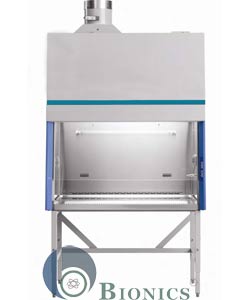Class 2 Biosafety Cabinets, the Unique Services/Solutions You Must Know
Class 2 Biosafety Cabinets, the Unique Services/Solutions You Must Know
Blog Article
Class 2 Biosafety Cabinets – Vital for Lab Safety and Biological Containment

Modern laboratories prioritise safety for workers, materials, and environments. Whether it's handling live pathogens or sensitive diagnostics, biosafety cabinets play an integral role in contamination prevention and sample integrity.
Of all types, Class 2 cabinets are most commonly used due to their efficiency and versatility. These units are essential for labs working with infectious materials or clinical diagnostics.
Biosafety Cabinets – How They Work and Why They Matter
Biosafety cabinets are ventilated enclosures built to protect both users and biological materials. They use advanced filters to trap harmful particles before air re-enters the lab.
These units are generally classified into three main types: Class I, II, and III based on containment level. Among these, Class 2 cabinets are the most versatile and commonly used.
Why Class II Cabinets Are the Preferred Choice in Labs
Class 2 Biosafety Cabinets ensure safety on all fronts—personnel, workspace, and biological material. They direct filtered airflow in a laminar pattern over the work surface.
Air is treated using dual filtration systems to ensure safe circulation and exhaust. These cabinets are frequently used in labs handling infectious agents or clinical samples.
Essential Features of Class 2 Safety Cabinets
A Class 2 microbiological safety cabinet includes several integrated safety mechanisms such as:
• High-efficiency air filters to ensure clean workspace air
• Steady air movement to reduce airborne particle circulation
• Negative pressure barriers to prevent leakage
• Germicidal UV lamps to disinfect the work area
• Noise-reducing construction for better working conditions
• Front glass for full control and protection
These elements create a clean, contained, and user-friendly workspace.
Where Class 2 Cabinets Are Used
Class 2 Biosafety Cabinets are key equipment in healthcare, molecular biology, and quality control. They are ideal for safe handling of Class 2 Biosafety Cabinets samples during testing and experimentation.
Hospitals, research labs, and manufacturing units depend on these cabinets for contamination control.
Benefits of Using Class 2 Biosafety Cabinets
Using Class 2 cabinets offers significant improvements in contamination control and user safety:
• Protects the integrity of lab work
• Prevents accidental exposure to infectious materials
• Improves environmental safety by filtering outgoing air
These cabinets help labs meet safety regulations while maintaining workflow.
Cabinet Types and Global Compliance
Top manufacturers ensure their cabinets meet certifications like NSF 49, EN 12469, and WHO recommendations. Class 2 units are sub-classified as A1, A2, B1, and B2—based on varying airflow balance and ducting needs.
• Type A2: Recirculates 70% and exhausts 30% of filtered air
• Type B2: Exhausts 100% of air via ducting; no recirculation
Selecting the right configuration ensures compliance and safety.
Tips for Purchasing the Ideal Biosafety Cabinet
Before purchasing, consider:
• The types of agents and materials handled
• Cabinet dimensions, ducting needs, and room layout
• Ease of use, energy efficiency, and upkeep
• Manufacturer reputation and post-sale support
Consulting with experts ensures the cabinet fits both budget and compliance goals.
Best Practices for Using Class II Biosafety Cabinets
For optimal results:
• Minimise airflow interference during operation
• Get periodic validation from certified technicians
• Train users in proper techniques and precautions
Operational best practices include:
• Maintain biosafety gear protocols
• Avoid sudden or quick arm movements
• Clean all contact points post-operation
• Use UV lights only when cabinet is off and unoccupied
Conclusion
Class 2 biosafety cabinets are essential for labs that value safety, precision, and cleanliness. They ensure contamination-free experiments and personnel safety.
From clinical research to vaccine development, Class II cabinets copyright the highest biosafety levels. When investing in a biosafety cabinet, prioritise compliance, usability, and long-term support—because lab safety is non-negotiable. Report this page